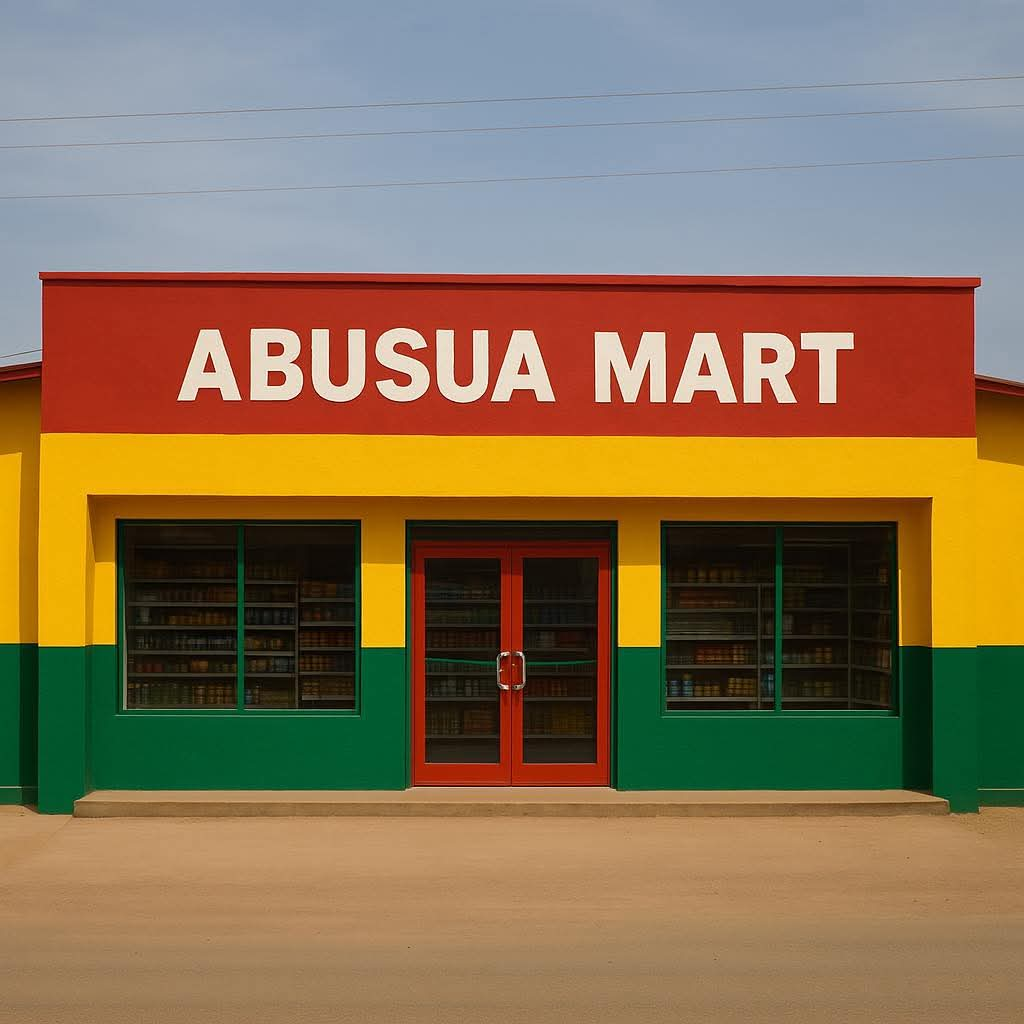There was a man named Kwaku Nyamekye. From the dusty streets of Techiman, he built a business that the people would come to know and revere as Abusua Mart—the supermarket of the people, by the people, and for the people.
It started as a tabletop shop—two crates of soft drinks and three buckets of gari, groundnut, and sugar—right under the neem tree that watched over the lorry station like a patient grandmother. Kwaku Nyamekye, whose mother sold charcoal and whose father died with a hoe in his hand, understood one thing: “Nsa a wode to wo fie, na ɛno na ɛyɛ adeɛ.” The hand you use to build your house is the hand that makes it beautiful. And so, he worked with diligence, honesty, and a friendliness that made even strangers feel like kin.
Within five years, Abusua Mart had grown into a mini-chain with four branches across the Bono East Region. Every signboard bore the same proud colours—red, gold, and green—shouting the name that had become a household chant. His pricing was fair, the shelves never ran empty, and the workers were paid on time. The market women smiled when they spoke of him, and even the regional minister once said during a durbar, “If we had ten more like Kwaku, Ghana would be a lion among cubs.”
The Ascent: What He Got Right
Kwaku’s early success was no accident. It was anchored in solid business principles:
1. Market Understanding – He knew his customers well. He stocked products that met their everyday needs and adjusted his inventory based on seasons. During harvests, he bought in bulk and priced low. During lean seasons, he provided smaller packages for affordability. That is what business scholars call customer-centric strategy.
2. Financial Discipline – Unlike others, he did not spend today’s profits on tomorrow’s luxuries. He reinvested profits into expansion, technology, and staff development.
3. Leadership – He treated his employees like family—eating waakye with them on Fridays and taking interest in their children’s school fees. This built loyalty, and loyalty, like yam in good soil, bore fruit.
4. Brand Identity – The name “Abusua Mart” carried the promise of community. His tagline—“We are family”—was not just a slogan; it was a way of life.
And so he rose. Fast, high, and proud. But as the elders say, “When the lizard climbs to the top of the iroko tree, it must remember the wind is stronger up there.”
The Fall: What He Failed to See
What brings a man to greatness is not always what sustains him there. Kwaku Nyamekye, for all his brilliance, failed to see that success, like a knife, cuts both ways.
1. Overexpansion Without Systems
Flush with profit and public praise, Kwaku opened five more branches in under two years. But he had not built the internal systems to sustain such growth. Inventory was mismanaged. Goods expired on shelves. Managers took liberties with funds. What should have been an empire became a sieve leaking money faster than he could patch.
2. Neglecting Data and Trends
While the world moved toward e-commerce, digital payment, and customer data analytics, Abusua Mart remained grounded in paper receipts and guesswork. He had built a business on intuition, but failed to evolve into intelligence. His competitors began offering mobile apps, delivery services, and loyalty programs. Abusua Mart, once a pioneer, became a relic.
3. Poor Governance and Delegation
Kwaku was everything—CEO, procurement officer, human resource head, and sometimes, cashier. He did not trust others to lead, and so decisions bottlenecked at his desk. When illness struck him for three months, the business became rudderless. By the time he returned, three branches had closed and creditors were circling like vultures.
4. Debt Mismanagement
In the height of his growth, Kwaku had taken loans to fund expansions. These were not necessarily bad decisions—many successful businesses thrive on debt. But he underestimated the repayment schedule and overestimated future profits. When revenues dipped, he could not service the loans. The banks came knocking, and their knock was not gentle.
A Caution Etched in Red Dust
In the end, Abusua Mart collapsed. Not because Kwaku was not smart. Not because the people did not love him. But because he failed to recognize that success, like palm wine, must be handled with care. Left too long in the sun, it turns sour.
He now sits quietly under the same neem tree where it all began, his hair kissed by grey and his eyes filled with stories. And when young entrepreneurs come to seek his wisdom, he tells them:
“Build like the tortoise—slow, sure, with your home on your back. And never confuse motion for progress. The wind may be behind you, but it is the roots that hold the tree.”
This is the story of Abusua Mart. A story not of failure, but of unheeded warning. Of a business that climbed the mountain, but forgot to bring rope.
And so we begin our journey through the dust and the gold of Ghanaian enterprise. Not to mourn the fallen, but to learn from their bones.
For the antelope does not forget the spot where the lion caught its brother.
Source: Charles Wundengba


